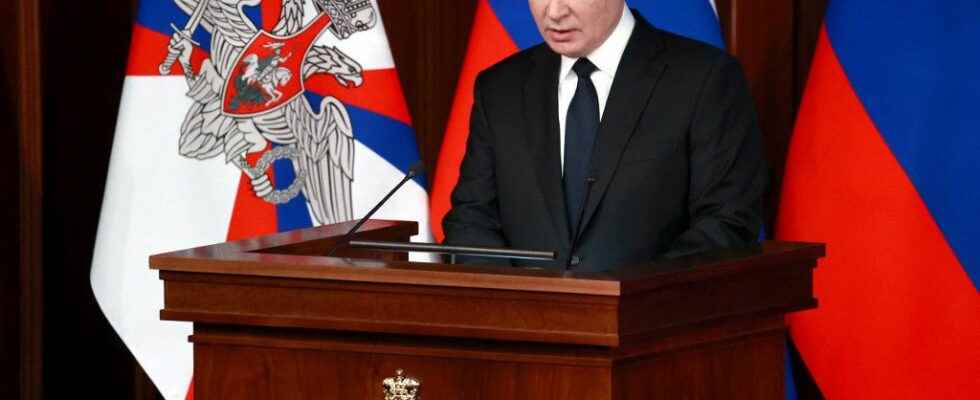Despite the more than mixed results of his “special military operation” in Ukraine, Putin gives no sign of wanting to back down. When Ukrainian President Volodymyr Zelensky flew to the United States on Wednesday December 21, the head of the Kremlin spoke at a meeting bringing together many senior Russian officers to define the objectives of his army in coming years.
One of them has particularly caught the eye: reaching a force of 1.5 million soldiers, in order, according to its Minister of Defense Sergei Shoigu, “to guarantee the fulfillment of the tasks aimed at ensuring the security of Russia “. The Russian army currently has around one million men, compared to two for China and 1.4 for the United States.
“It’s not all about the number of men”
Problem: if on paper this figure is impressive – it is 350,000 men higher than the previous objective set by Vladimir Putin last August – reaching it already looks complicated. “When you increase the numbers to this point, you still have to be able to supervise and train them, points out Michel Goya, former colonel of the navy troops, now a war historian. But a large part of the trainers has already been engaged in Ukraine, so we wonder how the Russians intend to do when they are already completely overwhelmed by the wave of mobilized who were called up in September.
A necessarily long and tedious operation. So that, according to a note of the Institute for the Study of War, a Washington-based think tank, “it is highly unlikely that the Kremlin will form such a large conventional force in a timeframe relevant to Russia’s war in Ukraine.” Especially since the issue of troop training is not the only stumbling block.
“It’s not all about the number of men in absolute value: you also have to be able to provide them with suitable equipment, underlines Léo Péria-Peigné, weapons and forecasting researcher at the Center for Security Studies of the French Institute for International Relations. When we see the difficulties that the Russian army has in providing the necessary equipment to its forces present in Ukraine, one can wonder about its ability to achieve this in even larger proportions. The recession into which the Russian economy has entered following the numerous Western sanctions to which it is subject does not facilitate the allocation of new resources for the training of new brigades either.
Really useful Zircon missiles?
“We have no funding limitations. The country and the government give everything the army asks for. Really everything!” However, assured the Russian president in the middle of the week. “Putin may decide to appropriate Russian public funds in such a way as to allow the Kremlin to deploy a large conventional army at the expense of economic growth and consumer comfort, as the Soviets did,” notes the Institute for the Study of War. In fact, the Russian president also announced the entry into service “at the beginning of January” of the new Zircon hypersonic missiles – advanced systems developed by Moscow in recent years – supposed to reach the speed of Mach 9 (11,000 km / h).
For what use in the war in Ukraine? “Because of its speed, this missile is considered almost unstoppable: its interest is above all to be used against high value targets, such as an aircraft carrier for example, explains Michel Goya. But using such sophisticated weapons, expensive and rare to hit quite classic targets in Ukraine, it’s a waste. Much less sophisticated and expensive missiles can do the same job. Through this announcement, Moscow is mainly conducting a communication operation.” Zircon is one of the “invincible” weapons that Putin presented with great fanfare in 2018, accompanied by this warning to Westerners: “Listen to us now!”
In the same way, the head of the Kremlin also promised to continue “to maintain and improve the combat readiness of our nuclear triad”. “The conventional potential of Russia was discredited during this war, slips Léo Péria-Peigné. So today what is left for it? The fact of being a power that must be taken seriously, this that Putin tirelessly reminds of each disappointment.” A one-upmanship strategy that has so far proved to be quite futile on the battlefield.
